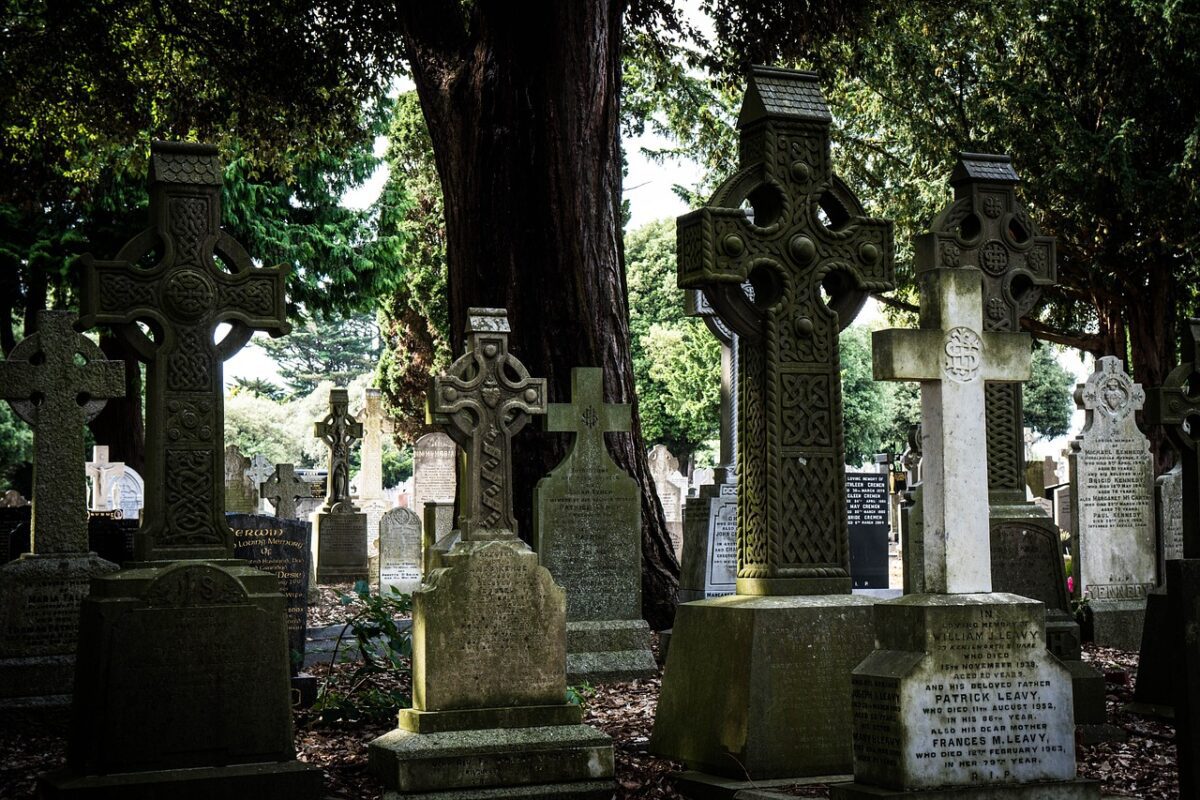
Take a glimpse before making your purchase and embrace the essence of this meaningful collection.
Funerals are always a difficult time, and it can be challenging to find the right words to say to honor and remember our loved ones. If you are looking for comfort during this time, Irish blessings offer a way to pay tribute to the life that your loved one lived, and to send them off on their next journey with love and blessings. In this blog post, we will share with you 7 powerful Gaelic prayers that you can use during a heartfelt funeral.
Irish blessings hold a significant place in funeral proceedings, serving as a profound means of expressing grief, honoring the departed, and offering solace to the bereaved. The usage of these blessings is deeply rooted in Irish culture, often serving to bridge the gap between this life and the next. They are seen as a medium to convey heartfelt feelings and wishes for the deceased’s peaceful journey beyond. The importance of these Irish blessings is further underscored as they echo a cultural heritage steeped in spirituality and a deep respect for life and death. Thus, the Irish blessings lend a unique, compassionate touch to the farewell process, while also providing a comforting connection to our cultural roots.
The Irish are well-known for their traditions, and their prayers are one of the most revered and beautiful ones. These ancient Gaelic prayers do not only provide comfort, but also celebrate the life of the deceased with gratitude and depth. In this post, we will share with you seven of the most powerful Irish blessings that you could use in a heartfelt funeral.
1. The Irish Blessings of Saint Patrick
“May the road rise up to meet you,
May the wind be always at your back,
May the sun shine warm upon your face,
May the rains fall soft upon your fields,
And until we meet again,
May God hold you in the palm of his hand.”
This prayer is one of the most famous of all Irish blessings. It is rumored to have been first uttered by St. Patrick himself, the patron saint of Ireland. The stirring and evocative words of this prayer reinforce the idea that the deceased is now in God’s loving embrace. The words of this Gaelic prayer carry a message of hope in a time of sadness.
The importance of the Irish Blessings of Saint Patrick extends far beyond mere condolence; it represents a deep-seated cultural heritage and a pathway for emotional healing. This blessing, like most Irish blessings, is rooted in empathy and respect, underscoring the belief that the departed is on a journey towards eternal peace and love.
Characteristic of the Irish blessings, this prayer acknowledges God’s grace, acting as a beacon of hope in times of despair. Its words are a gentle reminder that although the person is physically gone, they continue their journey in a place that promises warmth, protection, and serenity. The Irish blessings, in particular this one, help articulate the unsaid feelings of loss, offering comfort to the bereaved, and reinforcing the belief in life after death.
With its roots tracing back to Saint Patrick, the patron saint of Ireland, this blessing is a testament to the enduring influence of the Irish blessings on the Irish culture. It encapsulates the essence of the Irish blessings – love, comfort, and respect.
Lastly, the Irish blessings, including this one, serve a therapeutic role. They offer a way for the bereaved to express their feelings and find solace in the thought of their loved ones living on in a better place. The Irish blessings, therefore, add a unique dimension to the grieving process, making them a vital part of Irish funerals.

2. The Irish Blessing of Light
“May the light of heaven shine upon your soul
May the peace of God surround you and make you whole
May the grace of Christ be with you now and always
May you rest in peace forever and ever always”
This Irish prayer is particularly powerful as it speaks to the comfort and solace that families feel when their loved one passes. The prayer offers a sense of hope, as it describes the peace of God surrounding the family, and it is meant to provide closure and acknowledgement in a time of grief.
The Irish Blessing of Light stands as a beacon of hope and comfort, embodying the very essence of the Irish blessings. The prayer’s lines speak directly to the grieving individuals, enveloping them in a warm, consoling embrace and assuring them of the serenity that awaits their loved one. The Irish blessings, and especially this one, serve a dual purpose – to honor the deceased and console the living.
The importance of including this Irish blessing in funerals cannot be overstated. The blessing is not just a mere recitation of words, but a tribute to the departed soul, wishing them an eternal abode of peace and light. In the Irish blessings, there’s a profound sense of respect and empathy for the departed soul, and an affirmation of their journey to a realm of divine grace and tranquility.
Moreover, the Irish blessings play a crucial role in the healing process of the bereaved. The words of the blessing aim to provide solace, to ease the pain of loss, and to reinforce the belief in life after death. Through the Irish blessings, mourners are encouraged to acknowledge their grief while also finding comfort in the thought of their loved one in a state of eternal peace.
In essence, the Irish blessings, such as the Irish Blessing of Light, are much more than prayers. They are a testament to the enduring Irish tradition of honoring the departed, a source of solace for the bereaved, and a celebration of the enduring spirit of the departed soul.
Incorporating them into funerals not only pays homage to these deep-rooted traditions but also provides a medium to express the unsaid, to grieve, and ultimately, to heal.
3. The Irish Blessing for a Departed Loved One
“May flights of angels sing thee to thy rest.”
This prayer is a simple, yet profound way to remember a loved one who has passed away. The beautiful language of this prayer allows the reader to reflect on the idea of heavenly peace. It is often recited by those who wish to remember and honor someone who has passed.
The third Irish blessing, “May flights of angels sing thee to thy rest,” is imbued with profound emotion and symbolism. The essence of this blessing lies in its tender wish for the departed soul’s peaceful journey to the afterlife. It’s a vivid imagery of angels, a universally recognized symbol of divine love and guidance, escorting the departed to their final resting place. Such a portrayal significantly aids in alleviating the heartache of loss.
The Irish blessings have a unique ability to encapsulate grand concepts into simple, digestible phrases. This particular blessing serves as a testament to that. By incorporating it into funeral ceremonies, we encourage the expression of grief in a respectful and cathartic manner. It provides a space to acknowledge the sadness of the moment, but also to contemplate the tranquil journey the departed is believed to embark upon.
The Irish blessings, therefore, serve a dual purpose. On one hand, they offer solace and closure to the bereaved, while on the other, they ensure the departed are remembered and honored in a dignified way. A testament to the power of these blessings is their ability to resonate deeply even beyond the Irish culture, touching hearts universally.
In conclusion, the relevance and importance of including the Irish blessings, such as “May flights of angels sing thee to thy rest,” in funerals cannot be overstated. They provide a solemn, respectful avenue to express grief, remember the departed, and find solace amidst pain. They symbolize the balance between mourning and celebrating life, a cornerstone of the healing process, and a vital feature of the Irish blessings.
The Irish blessing, “May flights of angels sing thee to thy rest,” has found profound resonance beyond traditional Irish culture and funeral ceremonies. This was evidenced when it was employed as the final line in King Charles III’s first address following the passing of his mother, Queen Elizabeth II.
In this emotionally heavy moment, King Charles III chose to encapsulate his sentiments in these simple yet poignant words. This usage signifies the wide-reaching influence and universal appeal of the Irish blessings. The quote’s utilization in such a historic and public speech underscores its power to convey deep respect, love, and the hope of peaceful rest for the departed.
Moreover, it underlines the comforting and empathetic nature of the Irish blessings, that even in the highest echelons of society, they were deemed fitting to articulate the profound sadness of loss and the wish for a serene transition to the afterlife for Queen Elizabeth II.
4. The Irish Prayer for the Dead
“Eternal rest grant unto them, O Lord, and let perpetual light shine upon them.
May the souls of all the faithful departed, through the mercy of God, rest in peace.”
This is a common Irish prayer for the dead. This prayer reinforces the idea that the souls of the faithful dead rest in peace, and it offers solace to the living through the assurance that their loved one is at peace. This simple yet powerful prayer can be recited during the funeral service.
The Irish Prayer for the Dead is a poignant example of the Irish blessings, embodying their characteristic empathy, comfort, and respect. At its core, it is a prayer for peace, expressing the hope that those who have passed on may find tranquility in the afterlife.
The significance of this prayer in funeral ceremonies is deeply intertwined with the values and beliefs that permeate Irish culture and the Irish blessings. It conveys the conviction that, in death, the soul finds a serene resting place, a sentiment that brings immense comfort to those left behind. By including this prayer in funerals, the bereaved are offered a form of consolation, a reassurance that their loved ones have moved on to a peaceful rest.
The Irish blessings, such as this prayer, serve a crucial role in the grieving and healing process. They act as a gentle reminder of life’s transient nature, while affirming the enduring spirit of the deceased. The Irish blessings also emphasize the importance of celebrating life, even in the face of death, and this balance between mourning and celebration is key to the healing journey.
Inclusion of this prayer, and other Irish blessings, provides a profound sense of solace and empathy, which are much needed during periods of grief and loss. Their universal appeal lies in their ability to articulate complex emotions with simplicity and deep respect. The Irish blessings, including the Irish Prayer for the Dead, beautifully encapsulate these sentiments, giving voice to the unspoken and comforting the grieving heart.
5. The Irish Blessings of Saint Patrick
“May the Irish hills caress you.
May her lakes and rivers bless you.
May the luck of the Irish enfold you.
May the blessings of
Saint Patrick behold you.”
As we transition to point 5, another significant Irish blessing emerges in the form of a poetic benediction. This blessing is often heard in Irish funerals, carrying an important role in both the ceremony and the healing journey that follows.
The first line, “May the Irish hills caress you,” signifies the comforting embrace of the Irish homeland, a symbol of warmth, security, and familiarity. The reference to the natural elements of Ireland – its hills, lakes and rivers – encapsulates the Irish belief in the comforting presence of nature during times of distress, an integral part of the Irish blessings.
The phrase “May the luck of the Irish enfold you,” carries the hopeful message that the deceased is being carried over to the afterlife under the protective wings of good fortune. This part of the Irish blessings invokes the universally recognized ‘Luck of the Irish,’ which is synonymous with the bestowing of good luck and fortune.
Lastly, “May the blessings of Saint Patrick behold you,” is a powerful invocation of St. Patrick, the patron saint of Ireland. This part of the Irish blessings seeks divine protection for the departed soul, a common theme in Irish blessings. In essence, this blessing offers a sense of consolation to the bereaved, alluding to the belief that their loved one is under the divine guardianship of St. Patrick in the afterlife.
In conclusion, this blessing, like other Irish blessings, plays an important role in Irish funerals by providing comfort, invoking protection, and acknowledging the natural cycle of life and death, all while maintaining a deep sense of respect and empathy.
6. The Irish Blessings – “Those We love Don’t Go Away”
Those we love don’t go away,
They walk beside us every day,
unseen, unheard, but always near,
Still loved, still missed and very dear.
Point 6 of “the Irish blessings” carries profound significance. “Those we love don’t go away, They walk beside us every day, unseen, unheard, but always near, Still loved, still missed and very dear.” This part of the Irish blessings expresses the enduring presence of the departed, offering comfort in the belief that though they may be physically absent, they persist in spirit. While not seen or heard, their essence remains present, continuing to offer guidance, love, and strength.
Still as much a part of the lives of the living, this Irish blessing assuages the sorrow of loss with the tender reminder that our loved ones are always near, still loved, still missed, and indeed very dear. The Irish blessings, in this sense, represent a gentle, empathetic acknowledgement of the pain of loss, while simultaneously providing solace through the promise of the deceased’s unseen, unheard, but persistent presence.
In essence, this specific phrase of the Irish blessings delivers an important message: while death may take our loved ones from our sight, it cannot remove them from our hearts or our spirits. In the Irish blessings, death is not seen as an end, but a transition to another form of existence where our loved ones remain close to us, guiding and comforting us in unseen, unheard, but deeply felt ways. This comforting aspect of the Irish blessings underscores their role in offering solace and understanding, reminding us of the enduring bond of love, even beyond the veil of death.
7. The Irish Blessings
The grief of our loss may be with us for a long time, but the joy of our memories will stay forever.
The 7th blessing in the collection of the Irish blessings carries immense significance, particularly during funerals. This blessing acknowledges the profound grief that accompanies loss, but it also emphasizes the enduring joy that memories can provide. As it says, “The grief of our loss may be with us for a long time, but the joy of our memories will stay forever.”
In the context of funerals, this sentiment is especially poignant. It serves as a powerful reminder that while the pain of losing a loved one may linger, the cherished memories we hold of them will forever remain in our hearts, offering solace and comfort. This is an integral aspect of the Irish blessings, as it delivers a message of hope amidst the sorrow of loss.
While mourning the physical absence of the deceased, attendees of the funeral are encouraged to celebrate the life lived, cherishing the memories as everlasting tokens of love. The Irish blessings, in this way, facilitate a shift in perspective from despair to acceptance, and eventually to appreciation for the experiences shared with the departed. Their enduring influence encourages us to treasure our memories, allowing them to bring us joy and comfort even in the face of loss. This central tenet of the Irish blessings bestows upon them a potent role in funeral services, providing a comforting reassurance that despite our grief, the joy of our memories will remain with us, forever.
8. The Irish Blessings
Death leaves a heartache
no one can heal;
Love leaves a memory
no one can steal.
The first part of this blessing in our discussion, “Death leaves a heartache no one can heal; Love leaves a memory no one can steal,” encapsulates the dual nature of loss. The first part, “Death leaves a heartache no one can heal,” acknowledges the deep, irreplaceable grief that accompanies the loss of a loved one. It expresses the understanding that the pain caused by death is profound, and cannot be simply healed or erased.
The second part, “Love leaves a memory no one can steal,” offers a counterbalance to the pain of grief. It focuses on the enduring power of love, suggesting that even in the face of death, love prevails through the memories it leaves behind. These memories are personal, precious, and unique to each individual’s relationship with the deceased. They are inviolable treasures that no one can take away, providing a source of comfort and solace.
This blessing, like many Irish blessings, juxtaposes the sorrow of loss and the comfort of memory, acknowledging the pain while offering a hopeful perspective. It stands as a potent affirmation of the everlasting presence of our loved ones through the memories they have left us, even in the wake of their physical departure.



